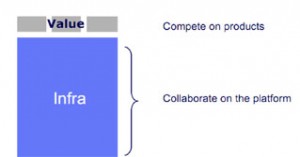IdeaConnection Innovation
BLOG
An Historical Perspective on Innovation
Nov-20-10 By AmindaThe great inventor Leonardo Da Vinci contributed tremendously to advancements in the arts and sciences with his study and invention in fields including human anatomy, civil engineering and optics. His designs were so advanced that it was not even feasible to construct most of them during his lifetime.
Despite his great contribution, Da Vinci had the potential to be even more effective. The man was known for working in secret, writing and drawing in coded, unorganized notebooks most of which weren't even published until hundreds of years after his death. In our modern society, where information moves in seconds, not decades, such research, requiring a team of project managers and linguists to sort and interpret, might likely end up in the trash. While big, future-oriented ideas certainly have their place, most companies would like to break through the many immediate challenges that are hindering them from progress.
The Mark of Legitimacy?
Nov-18-10 By AmindaCrowdsourcing: noun the practice whereby an organization enlists a variety of freelancers, paid or unpaid, to work on a specific task or problem: Kodak used social media crowdsourcing to engage its customers in their naming contest.
While this looks like a legitimate dictionary entry, it's not. At least yet. The word crowdsourcing was among those nominated by the New Oxford American Dictionary for their Word of the Year. Unfortunately, it was beat out by "refudiate," a word invented by Sarah Palin in a misguided twitter post.
Fortunately, the selection of a Word of the Year does not mean the word will be added to Oxford dictionaries - at least any time soon. Rather the choice is based on buzz - the amount of attention the word has received over the previous year and whether its usage has grown. This is quite an accomplishment for "refudiate," a term that didn't even exist until July of this year and probably won't even be remembered this time next year. Case in point, does anyone still use "bovvered," the 2006 Word of the Year? On the other hand, the word twitter and its many variations, none of which have made WOTY, have all become completely ingrained in our lexicon.
How To Convert Ideas Into Profitable Innovations: Three Corporate Idea-Improvement Programs
Nov-14-10 By Edward GlassmanIdea-improvement needs special effort in most companies. People with ideas may not have the business sense to see its potential or limitations, or the idea may lack data and clarity so no one sees its value when presented to management. An ‘Idea-Enhancement Innovation Program’ minimizes these problems by providing idea-people with the means to develop and evaluate their own idea before presentation to management, and by enabling management to make informed decisions about the idea.
I interviewed the head of ‘idea-improvement innovation programs’ in three Fortune-500 corporations to discover why they were successful. They remain anonymous.
These innovation programs solicit ideas, enhance them, and then persuade management to support the idea with resources. Such innovation support systems help idea-people to become involved in the identification and early development of ideas for new business opportunities through new technology, new products, and new processes.
In other words, these idea-enhancing programs enable people to dress up their idea before review by senior management who provide the resources for further development.
Universities Spin-out Open Innovators
Sep-20-10 By AmratContrary to common perception the ideas of open innovation have been around for a very long time. These open innovation efforts however were not institutionalized. The first institutions to nurture open innovation are the universities. As compared to many commercial open innovators they have been eager 'open innovators' for decades. The traditional technological exploitation vehicle employed by universities is the spin-out company. A spin-out company will generally be a separate legal entity created to own and exploit an intellectual property resource. These created companies are therefore legally independent from the university.
IBM Eclipse
Sep-17-10 By AmratIn a world of knowledge spillovers, open innovation asserts that knowledge that is external to a company and therefore can be profitably exploited if matched to the firm's core competencies. The basic idea is that the boundaries between a firm and its environment have become more permeable, so innovations can transfer inward and outward. In a similar manner, unused or under-exploited internal knowledge can create revenues if properly disseminated to third parties, i.e., through licensing, joint ventures, spin-offs, etc. IBM used this concept of Open Innovation perfectly to create the Eclipse platform, where competing companies are invited to co-operate inside an open innovation network.
The eclipse community has established a model for multiple corporations to create innovation networks. The open innovation paradigm treats R&D as open system. IBM is reinventing the way it innovates. The decision to invite outsiders and open up the innovation process reflects one of the most intriguing concepts in the corporate strategy today. IBM has built what it calls an “open ecosystem” of chip R&D with many partners like advance micro devices Sony, Toshiba and Albany nanotech etc.
Toyota’s new robot can play the violin
May-14-10 By Paul WagornToyota is of course very well known for making cars, but not really for making robots - this is Honda domain. That being said, Toyota has been working on this robot for 3 years, and has now decided that it is ready for public viewing.
Open Innovation is not a Threat to Consultants
Mar-27-10 By Scott WurteleAt first look, it appears that Innovation Intermediaries, with their access to tens of thousands of brilliant experts, would scare consultants.
Debating Communal Creativity
Mar-02-10 By KristeenThis week Peter Lloyd looks into the debate of Communal Creativity and explores both sides of the argument. In so doing, he himself quotes famous authors and musician on their perspective of plagiarism, originality, authenticity, or what have you.
Strength in Numbers
Feb-22-10 By KristeenWith his Master's Degree in Biochemistry, Joseph Hawumba returned to Makerere University where he teaches biochemistry to science, medical, and veterinary students. He also carries out frontline scientific research and writes academic papers. Hawumba became a Problem Solver on IdeaConnection and was recently interviewed on his success.
3RD World Wheelchair
Feb-18-10 By KristeenAmos Winter, a MIT graduate student, has developed an innovative mobility aid specifically for developing countries. Conventional wheelchairs are nearly impossible to propel on the sandy roads and muddy walking paths frequently encountered in the developing world. The Leveraged Freedom Chair (LFC) uses an innovative approach to solve this problem by assembling this wheelchair from available bicycle parts.
Page: 1 - <100 - <10 - 99 100 101 102 103 104 105 - 109 Next»








